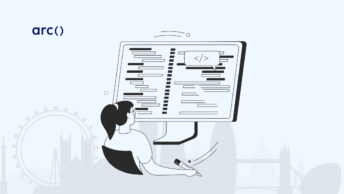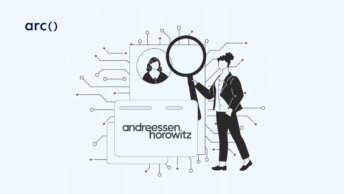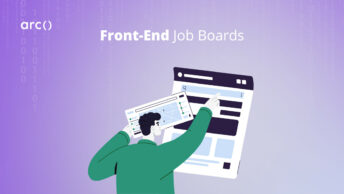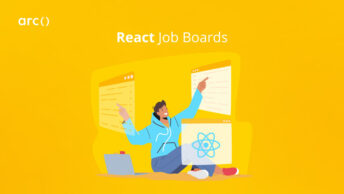If you are a software engineer looking for a change in your career, getting the attention of a technical recruiter is one of the best ways to pursue that goal.
We’ve interviewed technical recruiters from Salesforce, Sourceress, and our own team here at Arc to gain insight on how to do just that.
Here are some specific, actionable tips for programmers to get noticed and advance through a technical position’s recruiting stages, whether it be for a full-time role or a freelance gig.
Looking to hire the best remote developers? Arc can help you:
⚡️ Get instant candidate matches without searching
⚡️ Identify top applicants from our network of 350,000+
⚡️ Hire 4x faster with vetted candidates (qualified and interview-ready)
Try Arc to hire top developers now →
Getting Noticed by Technical Recruiters
You can spend countless hours scouring job boards, but, if you want the leads to find you, you have to be active in the online developer ecosystem where recruiters are searching. It’s as simple as that.
This section goes over some of those spaces. Some of these may seem obvious, but we’re going to go over them anyway. After all, you should never underestimate the power of a tweet.
Yep, you should be on Twitter. Being active on Twitter is a great way to identify and interact with people in your field. Keeping up with dev rockstars like Jeff Atwood or Mina Markham can also make for impressive conversation starters later in the recruiting process.
Blogging
You can catapult your Twitter ROI if you tweet your own blog posts. All of the recruiters we spoke to said having your own programming blog increases visibility and credibility. If you’re not sure what to blog about, you can join a great software developer community and tune in to the discussion.
If you are not on LinkedIn, welcome to the 21st century — you’re late but welcome. Join and share in programming groups that match your interests, like Developers and Java Developers.
Sourceress co-founder and CTO, Josh Albrecht, advised that “whether you are looking for a job or not, keep your LinkedIn profile up-to-date.” You never know when the right opportunity will come looking for you.
Online portfolio
Have a personal website that serves as your online portfolio to showcase completed work. Your portfolio should demonstrate that you can, in fact, code and develop functioning websites and features. Learn how to build a great software developer portfolio, or have a look at these web developer portfolio website examples for some inspiration!
Side-projects
A GitHub presence is a great way to show passion for programming and continued learning. You can do this by contributing to open source projects or using the repository for your own passion projects.
Why self-promote?
The purpose of all this activity is to get your work and name in front of recruiters. Josh has some on-point tips for self-promotion:
Say what you are looking for. Share what you are interested in. Be upfront about the stuff you are excited about. People [will] find you and reach out if you do that effectively.
Josh Albrecht, co-founder and CTO of Sourceress
Read More: High Paying Remote Dev Jobs Hiring Now
Initial Screening
As recruiters pore over the sea of candidate profiles during initial online screening, they will primarily use three criteria to filter candidates: work history, tech stack match, and educational background.
Work history
In addition to relevant programming experience, recruiters are looking for career development. This means your previous positions should demonstrate a clear growth trajectory. You may have started with programming-related internships or engineering boot camp, moved on to a junior developer role, and then up from there.
Moving to bigger companies or opportunities that are more suited to your skills and interest is welcome, but multiple short-term positions may be a red flag. Based on our interviews with recruiters, it’s ideal to hold a position for at least one year.
If you’ve had experiences that lasted less than one year, it may not disqualify you, but be prepared to explain the circumstances. If several of your experiences have lasted less than a year…stay at your current job!
Tech stack match
Each company looks for people familiar with their chosen technologies. Your online portfolio, LinkedIn, resume, etc., should detail your languages of expertise, years of experience, and use applications from completed projects.
While a tech stack match may help get you past the first hurdle, it will be more important to demonstrate a strong conceptual background during the interview. This is especially true with smaller companies and startups that will be looking for someone able to adapt quickly.
Read More: Forbes’s Best US Startups Hiring Now for Remote Developers
Educational background
Even in a world where accomplishments count more than credentials, it’s important to note that a four-year degree is still one of the first criteria recruiters use to cut down the size of a candidate pool.
Having a computer science degree listed on your resume is going to boost your chances of making the first cut. However, this isn’t usually a hard requirement. According to a StackOverflow survey, 56% of software engineers do not hold a CS degree. Other technical degrees, like electrical engineering, applied mathematics, physics, statistics, etc., will also receive preference.
If you have an unrelated degree or no degree, it’s still possible to stand out. Laszlo Bock, former Google Executive and head of hiring, has pointed out the value of those who succeed outside of the traditional path:
When you look at people who don’t go to school and make their way in the world, those are exceptional human beings. And we should do everything we can to find those people.
Laszlo Bock, former head of hiring at Google
Without a technical degree, you should plan to put in the same amount of self-education and experience that a four-year degree entails — that’s about 120 credit hours, times 3-6 hours of assignments, so up to 720 hours of self-learning.
Another option is coding boot camp. According to Course Report, 73% of boot camp graduates found job placements within three months of course completion and experienced an average salary increase of 64 percent.

Master the Screening Call
When you are contacted for an interview, it means you look good enough on paper for the recruiter to invest more time in your candidacy. Now they need more information. Derick, a recruiter from Salesforce, had this to say about phone screening:
In the initial screening call, I personally care most about your communication skills and level of interest in the opportunity. When I’m asking candidates to talk about their experiences, the best ones tend to be able to explain the technical things they’re working on in a way that a non-engineer can understand.
Derick, Salesforce recruiter
During these calls, recruiters will gauge your level of interest and communication ability, as well as for culture fit and values.
Level of Interest
Be ready to explain how this role fits into your career trajectory. Why is this opportunity appealing to you and what are you bringing to the table? Why is now the right time for you to make this move? Bonus points if you can make the case for why it is also the right time for the company to utilize your skills. To do this, you should research industry trends, the company’s business development, and explain how you can help them achieve future objectives.
Communication Skills
Since initial calls are often with non-technical interviewers, you should be able to explain technical issues in a non-technical way. Analogies are a great way to do this. A helpful exercise is to pretend you are explaining the concept to a seven-year-old — break down the problem into simple, understandable chunks, eliminate jargon, and, please, no condescending tones.
For example, you may be asked to explain the function of HTTPS. Here is a nice, clear answer adapted from Reddit user u/CharlieKillsRats using a “secret language” analogy.
Imagine you are talking to a friend at a party. You are having a sensitive conversation, but anyone in the room can overhear what you are talking about. To prevent this, you and your friend switch to a secret language that only the two of you know. Everyone else can still hear you talking, but to them, it’s just noise, and no one can make any sense of what you are saying. This is similar to how HTTPS protocols keep messages encrypted. By ensuring that only intended recipients know the “language” of the message, data is secured.
Reddit user u/CharlieKillsRats
In later calls, you will almost certainly be screened by an engineer to judge your technical communication abilities. They will be looking to measure your ability to clearly explain solutions to complex problems and your thought process.
Read More: How to Become a Software Engineer
Culture Fit and Values
Cultural fit and values go hand-in-hand. Recruiters will focus on your work style and workplace preferences. For example, you may ask something like, “What does your ideal work environment look like?” Or, “Which part of your previous work did you feel the proudest of or most frustrated with?” For programming values, the recruiter may be looking for things like clean code, readability, or speed.
Sample Phone Screening Process
Once you pass the initial online screening, each company may have a different process for phone screening. For our own development team, we have a three-part phone interview process consisting of technical screening, product-oriented screening, and a general feel culture fit screening.
Per our own lead engineer, “the technical screening call is to see that candidates meet a basic knowledge bar and have a developer’s mindset.” A favorite request candidates are likely to hear is, “describe the hardest bug you’ve encountered.”
Product-oriented screening is a great way to screen out candidates who are looking for just any opportunity from those who are specifically interested in our product. Knowledge and enthusiasm for the product are strong predictors of successful team integration and performance.
A general feel and culture fit screening are measured through a less structured conversation. Personality, interests, and values are hard to fake. Even if you manage to do so, you may not be happy with your new workplace — it’s best to just be yourself.
Our engineering lead also pointed out that throughout the process, the interviewer is listening not only for intelligent answers but questions as well. The questions a candidate asks provide good insight into their way of thinking, how passionate they are about programming, and how interested they are in the product and value proposition.
Read More: 12 Common Mistakes Keeping You From Landing Your First Developer Job
Answering the Tough Questions
You will inevitably get to that part of the interview where you will want to roll your eyes, curl up into the fetal position, or tell your interviewer to kindly retract their question. Of course, you can’t do any of these things. Instead, you need to give a well-thought-out answer to convey that you are the right person for the role. Here are some of those questions and how to deal with them.
Why are you leaving your previous job?
There is a 99.9% chance you will be asked about your previous position and your reasons for leaving. Derick, the Salesforce recruiter we spoke to, provided some follow up questions you might face:
Are you making this next career move for a particular reason? Why for this company? Why this position?
Derick, Salesforce recruiter
He pointed out that the answers to these questions say a lot about someone’s passion and culture fit for the position and the company.
What you want to do here is express that your previous post was a valuable experience. Provide examples of what you learned and how you have grown — and why this opportunity is the right move for your continued career development. Hopefully, that’s true, but if not, you’ll want to work towards that narrative.
If you left your previous job because of a conflict, professional or personal stagnation, demonstrate that you made multiple attempts to solve the problem, but ultimately, it was time to move on. You will be a great fit for this position for those same reasons.
What is your biggest weakness?
At first glance, this may seem like a ridiculous question. Are you really expected to admit the things you are bad at? Hold your cards close on this one.
What the interviewer is really looking for is for the candidate to recognize room for professional growth and evidence of efforts to improve. The best way to flip this question to your advantage is to provide an example where you struggled but overcame an obstacle. Some common challenges developers can talk about are setting requirements with clients, communicating with project managers, and committing to decisions across teams.
What is your current or previous salary?
Recruiters may or may not ask this question, but you should not be beholden to the compensation of your last job. Some local and state governments are realizing this too. It’s now illegal to ask about salary history in a number of places, including New York City, Pittsburg, New Orleans, Philadelphia, Delaware, Massachusetts, Oregon, and California.
If you are asked this question, you should reframe your answer as your salary expectations.
When formulating your salary expectations, in addition to considering the bottom line of your financial obligations, you should try to figure out what the company is paying someone with a similar experience level for this role, in this particular locality.
If you are unable to find this company’s info, look at their competitors. You can also use the U.S Bureau of Labor Statistics as a resource to help dig out these secrets.
Another pro-tip is to give a range rather than a hard number. This saves room for negotiation on both ends. Don’t lowball yourself. Make sure the lower end of your range covers your bottom line and is higher than what you believe is the company’s base pay.
Read More: How to REALLY Get a Job as a Self-Taught Developer
Insider Tips for Standing Out
So you’ve got a killer software engineering cover letter, resume, and portfolio, your LinkedIn is up-to-date, you’ve started blogging, and you are generally active in the developer community. Maybe this is enough to get you noticed by recruiters. Now, how can you give yourself an edge through the rest of the process?
Our recruiters here at Arc pointed out that the first contact is usually via written correspondence. With that in mind, when responding to an outreach email, you should make sure your prose is flawless. Be aware that it’s possible the recruiter is sending out dozens of these same emails, so your response should leave an impression.
Not only should your email be error-free, but try to be engaging and creative — let your personality shine through. This will be especially appreciated by startups that value personality and culture.
When you advance to the interview stage, you’ll want to show that you are a passionate and motivated developer. Now is the time to drum up a conversation about news and big names in the programming world, along with those rockstars you follow on Twitter.
A book list is also sure to impress. Discussing the authoritative programming books you have read or are working your way through will demonstrate dedication to your craft. Here are a few we recommend for your list:
- The Mythical Man-Month
- Programming Pearls
- Clean Code: A Handbook of Agile Software Craftsmanship
- Pragmatic Programmer: From Journeyman to Master
- Code Complete: A Practical Handbook of Software Construction
- Agile Estimating and Planning
- Soft Skills: The Software Developer’s Life Manual
- Head First Design Patterns: A Brain-Friendly Guide
- Refactoring: Improving the Design of Existing Code
- Designing Data-Intensive Applications: The Big Ideas Behind Reliable, Scalable, and Maintainable Systems
Read More: 5 Great Ways to Get Your Profile Noticed as a Software Engineer
Conclusion
Catching a recruiter’s attention and getting great job offers is going to take some legwork and will likely be an ongoing process now and throughout your career.
With the tips we’ve provided here, many distilled directly from interviews with software engineer recruiters, you should be well equipped to build your online presence and ultimately get recruiters proactively reaching out to you.
If you’ve got any other tips to share, let us know in the comments below!
You can also explore HireAI to skip the line and:
⚡️ Get instant candidate matches without searching
⚡️ Identify top applicants from our network of 350,000+ with no manual screening
⚡️ Hire 4x faster with vetted candidates (qualified and interview-ready)








